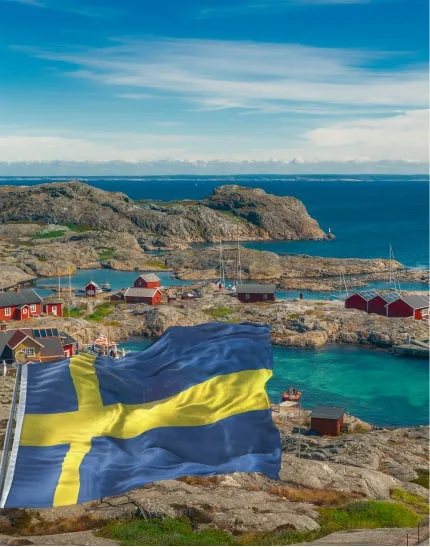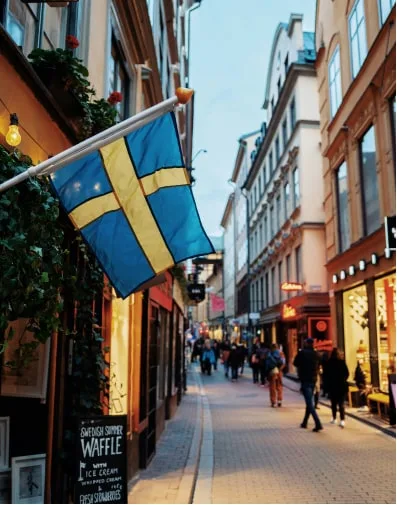
Gambling License in Sweden
Last Update: 17.11.2025
A Gambling License in Sweden is an authorization issued by Spelinspektionen, allowing operators to legally offer online casinos and other types of gambling to Swedish players. It represents the EU’s gold standard for player protection and operational transparency, which opens up access to European banking and payment services.
The Gofaizen & Sherle legal team provides end-to-end support for obtaining a Swedish license: we conduct project pre-screening and RG/AML audits, prepare a package of documents and a business model, coordinate technical certification and Spelpaus integration, submit and correspond with Spelinspektionen, set up bonus and marketing policies, and assist with accounts and payment providers.
A Gaming License in Sweden is an official permit issued by Spelinspektionen, the state regulator that controls the gambling market and ensures its transparency. This document gives companies the right to offer Swedish players online casinos, sports betting, and other forms of gambling in strict compliance with the legislation and standards of the jurisdiction.
The main purpose of the license is to protect the interests of players and ensure the integrity of operators. Spelinspektionen ensures that companies comply with responsible gaming principles, conduct financial monitoring, prevent money laundering, and guarantee the transparency of all processes. The license includes the Spelpaus self-exclusion system, which is uniform for all operators. If a player blocks themselves on this portal, they will be denied access to games at all licensed companies.
Licensing is mandatory for all operators targeting the Swedish market. It is necessary for companies that plan to:
- launch an online casino or betting platform in Sweden;
- cooperate with European banks and payment providers;
- bring their iGaming project to a legal level and increase the trust of investors and partners.
The Swedish license is considered one of the most prestigious in Europe. Obtaining it demonstrates a high level of compliance, transparency, and responsibility of the company towards players and regulators.

Advantages of obtaining a gambling license in Sweden
Obtaining a Swedish gambling license gives operators access to the regulated European market and strengthens the trust of players and partners. The main advantages of this license are listed below:
Prestige and reputation in the EU
The Swedish license is one of the most respected in Europe. It confirms that the operator works according to transparent rules, strictly adheres to responsible gaming standards, and is under the reliable state supervision of Spelinspektionen.
Trust of investors and partners
The gambling market in Sweden is regulated clearly and consistently, which increases the trust of investors, banks, and payment systems. For companies, this means a stable environment, predictable working conditions, and the ability to confidently scale their business.
Simple conditions for European operators
Companies registered in any EU or EEA country can apply for a license without having to be physically present in Sweden. This reduces administrative costs, simplifies the process, and shortens the time to market.
Stability and predictability of regulation
Sweden offers one of the most balanced regulatory systems – strict, but logical and understandable. Licensing rules do not change suddenly, and any updates are subject to open consultation with the industry. This creates long-term confidence and legal certainty for operators.
International recognition
Having a Spelinspektionen license strengthens a company’s position in the global iGaming market, facilitates the connection of European payment solutions, and opens up access to reliable partners. For players, it is a sign of security and honesty, and for businesses, it is a strong reputational asset and competitive advantage.
Request more information about Gambling License in Sweden
Types of gambling licenses in Sweden
Commercial online games and betting
This is a key category for operators working with digital products.
- Commercial Online Games covers online casinos, slots, and table games. Technical certification of the platform by an accredited laboratory and strict compliance with player protection requirements are mandatory.
- Betting License is a license to accept bets on sports and other events. Operators are required to comply with AML/CFT financial monitoring rules and responsible gaming standards, including integration with Spelpaus.
- A combined license is available for companies operating in both areas, which simplifies administration and reduces overall costs.
Lotteries and bingo
These licenses apply to public lotteries and bingo, both offline and online.
- Lottery License (Class I–III) – classes vary in terms of ticket sales and the level of regulatory control. As turnover increases, it is necessary to upgrade to a higher license class.
- Bingo License – a separate permit with an emphasis on transparency of payments, control of financial flows, and fraud prevention.
Horse racing, slot machines, and casinos
- Horse Racing License for operators organizing totalizators and accepting bets on horse racing. The main requirements relate to financial reporting and the transparency of operations.
- A slot machine license is issued subject to strict restrictions on the number, placement, and technical characteristics of slot machines in public places.
- Casino License for land-based casinos. Establishes a separate application and verification procedure, including in-depth control over financial stability, technical infrastructure, and security measures.
Card tournaments
Regulated by a separate permit depending on the scale of the event: local events or major international tournaments. Requires prior registration, documentary evidence of the sources of the prize fund, and strict compliance with security and responsible gaming standards.
The process of obtaining a gambling license in Sweden
Obtaining a Spelinspektionen license is a structured procedure that includes legal preparation, technical certification, and verification by the Swedish regulator. The process takes an average of 6-12 months from the submission of a complete set of documents to approval. Below is a step-by-step guide to applying:
Legal readiness
Step 1
Register your company in an EU/EEA country (or appoint an authorized representative resident in Sweden if your company is located outside the EEA).
Identify all beneficial owners (UBOs) and key officers – directors, compliance officers, heads of technical departments.
Prepare a complete corporate structure of the group, indicating all related companies and shareholdings.
Compliance and technical readiness
Step 2
Collect anti-money laundering (AML) policies and customer identification (KYC) procedures, develop responsible gaming measures with the integration of the Spelpaus self-exclusion system, the setting of deposit and betting limits, and mechanisms for warning of problematic behavior. Ensure compliance with GDPR requirements and implement a personal data protection policy.
Set up a system for logging all gaming transactions, ensuring real-time monitoring and remote access for the regulator. Obtain mandatory certification for gaming software, platforms, and random number generators (RNG) from an accredited testing laboratory (e.g., eCOGRA, GLI, iTech Labs, BMM Testlabs).
Please note that if you are a B2B gaming software provider, you will need a separate software permit from Spelinspektionen.
Document package
Step 3
Gather a complete set of documents for submission:
- A detailed business plan describing your target audience, business model, and marketing strategy
- A description of all gaming products and services
- Agreements with gaming providers, payment systems, and key partners
- Financial statements for the last 2–3 years (audited if the company is active); for new companies, a financial forecast and confirmation of capital
- Information about the ownership structure, UBO, and management, with confirmation of experience and business reputation
- Technical testing certificates from accredited laboratories
- Powers of attorney and documents confirming the signatories’ authority
Submission and interaction with the regulator
Step 4
Applications are submitted via the Spelinspektionen online service using the electronic signatures of authorized persons and payment of the initial license fee.
During the review process, the regulator may request additional materials or clarifications (supplementation requests) regarding technical aspects, financial stability, responsible gaming (RG) procedures, and anti-money laundering (AML) measures. Timely and comprehensive responses are critical to the successful completion of the process—delays in providing information increase the review period.
Decision, launch, and further obligations
Step 5
Once the application is approved, the company is entered into Spelinspektionen’s public register of licensed operators, after which European payment providers and banking partners are connected, and operations commence under the regulator’s ongoing supervision.
Request more information about the Swedish gaming license
Requirements for a Swedish gaming license
Key requirements for obtaining a license:
- The company must be registered in the EEA or have a branch in Sweden; for online gambling operators outside the EEA, a resident representative is required.
- Key individuals undergo reputation and suitability checks, including criminal records and business history.
- Financial stability is required – proof of solvency, sources of funds, and capital to cover fees and taxes.
- The gaming platform and software must be certified by an EU-accredited laboratory.
- Servers are located in Sweden, or remote access is provided for the regulator.
- All documents are submitted in Swedish, and the website must have a Swedish version.
- Mandatory integration with the Spelpaus self-exclusion system and implementation of responsible gaming measures: limits, notifications, and player activity monitoring.
- All bets are displayed in Swedish kronor; only licensed payment services are permitted.
- Internal AML/KYC procedures and the appointment of a compliance officer are required.
- An annual audit by a Swedish-registered auditor is mandatory.
Legal framework
Gambling regulation in Sweden has a long history, but the system in its current form was established on January 1, 2019, when the Gambling Act (2018:1138) came into force, replacing fragmented rules and creating a unified licensing model. Previously, the market was under a partial state monopoly, and foreign operators were effectively operating in a gray area. The new law opened the market to private companies, subject to mandatory licensing and strict control.
From that moment on, all operators offering gambling to Swedish players, both online and offline, are required to obtain a Gambling License in Sweden. The law became part of a broader reform aimed at protecting players’ rights, combating money laundering, and increasing the transparency of the industry.
Gambling regulation in Sweden is centralized. The Swedish Gambling Authority (Spelinspektionen) plays a key role. This body is responsible for licensing operators, supervising the market, and enforcing measures in case of violations.
The Gambling Act (2018:1138) is the key document regulating the entire gambling market in Sweden. It:
- establishes the concepts and classification of gambling (casinos, betting, lotteries, etc.);
- determines the procedure for licensing operators, including foreign ones;
- regulates the responsibility of licensees – requirements for compliance, player protection, and advertising;
- introduces the principle that a Gaming License is mandatory for anyone offering gambling in Sweden;
- provides for mandatory integration with Spelpaus (a self-exclusion system);
- regulates bonuses and marketing, limiting aggressive promotion;
- grants Spelinspektionen the right to issue, revoke, and suspend licenses, as well as apply financial sanctions.
It is this law that became the basis for the modern model of gambling regulation in Sweden.
Other key laws and acts for the Swedish gambling licence
- Gambling Tax Act (2018:1139) regulates the taxation of operators (18% rate on GGR), reporting and payment procedures.
- Gambling Ordinance (2018:1467) defines the procedure for obtaining licenses, requirements for applicants, and the supervision procedure.
- LIFS 2018:2 regulates responsible gaming rules, limits, notifications, and the protection of vulnerable players.
- LIFS 2018:4–10 sets requirements for lotteries, betting, commercial games, casinos, and technical standards.
- SIFS 2022:2–3 defines technical requirements and the accreditation process for independent auditing bodies.
- AML Act (2017:630) establishes requirements for combating money laundering and terrorist financing.

Taxes and other mandatory charges: Gaming License in Sweden
The Swedish taxation and fee system for gambling operators is based on a transparent and fixed model. This means that companies know their fiscal obligations in advance and can plan their operations without hidden payments.
Key tax rates and license fees applicable to Swedish gambling licensees:
| Type of tax | Rate | Description |
| Gambling tax (GGR Tax) | 22% of GGR | Applies to gross gaming revenue (the difference between bets and winnings paid out). Effective from July 1, 2024. |
| Tax exemption | 0% | Charitable and social lotteries may be exempt from tax under certain conditions. |
| Tax currency | SEK | The tax is payable in Swedish kronor. |
| Payment deadline | Monthly | Payments and reports are submitted to the Swedish Tax Agency (Skatteverket). |
The tax rate is fixed and uniform for all commercial online casinos and betting operators.
This simplifies financial planning and reduces the risk of unpredictable fiscal changes.
License fees and supervisory fees:
| Type of payment | Amount | Note |
| License registration fee | SEK 230,000 | Basic fee for applying for an online casino or betting license. Paid once. |
| Annual supervisory fee | SEK 264,000 per license | For online casino and betting operators. Paid annually to Spelinspektionen to cover supervision costs. |
| Annual fee for B2B software providers | 16,500 SEK | For gaming software providers. Significantly reduced from January 2025 (previously 120,000 SEK). |
| Licenses for lotteries, bingo, slot machines, and casinos | Various fixed amounts | Fees vary depending on the type of activity, license class, and scale of operations. |
| Fees for renewal and changes | Cancelled | From 2024, Spelinspektionen has cancelled fees for license renewal and changes. |
All fees are payable in Swedish kronor (SEK) and are non-refundable once paid, regardless of the outcome of the application.
In addition to taxes and fees, operators must take into account:
- Costs for technical certification of the platform by accredited laboratories
- Legal support and document translation costs
- Annual independent audit costs
- Spelpaus and the responsible gaming system integration costs
- Operating costs for compliance and AML/KYC procedures
Conclusion
Sweden is considered one of the most reliable and regulated jurisdictions in the European gambling industry. Obtaining a Spelinspektionen license opens up access to a transparent market with a high level of trust from players and investors. This license ensures regulatory stability, market prestige, and lawful access to European payment systems, but requires strict compliance with responsible gaming rules, technical certification, and financial reporting.
The Gofaizen & Sherle team helps you navigate all the key stages, from choosing the right type of license and preparing documents to communicating with the regulator and obtaining approval. This approach reduces the risk of rejection and speeds up the process. As a result, operators receive a reliable license in a prestigious jurisdiction with clear tax rules and a transparent oversight system.
FAQ about the Swedish gambling licence
What is the Gambling License in Sweden?
A Sweden gambling licence is an official permit issued by Spelinspektionen, which gives the right to legally offer gambling and betting in Sweden in full compliance with national legislation.
What is the minimum capital/financial capacity required for a Sweden gambling licence?
There is no fixed minimum capital requirement for a licence, but the applicant must demonstrate the company’s financial stability and sufficient resources to cover operating and licensing costs in Sweden. These requirements are mandatory for legal online gambling operations.
How long does the entire process take for a gambling license in Sweden?
The average processing time for an application is 6 to 12 months. The duration depends on the quality of the documents, the structure of the company, and the technical readiness of the platform. Thorough preliminary preparation significantly speeds up the process of obtaining a gambling license in Sweden.
What happens if the transaction violates the terms of the Sweden gambling license?
Violations can result in fines, suspension, or revocation of the Gaming License in Sweden. In serious cases, operations may be blocked and the company may be blacklisted by the regulator.